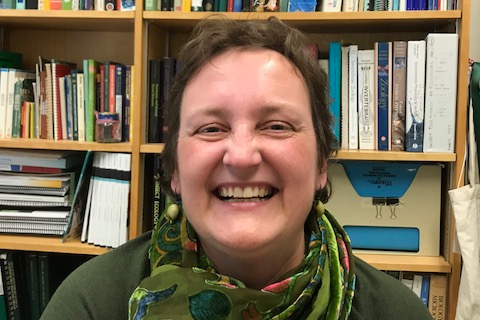
Maya Evenden, professor in the University of Alberta’s Department of Biological Sciences. Photo supplied.
The world of insects is diverse, dynamic, and one that we depend on, explained Maya Evenden, professor in the University of Alberta’s Department of Biological Sciences.
“I am inspired to make sure that students understand the roles insects play and their importance to human society,” said Evenden. “Far from being icky critters, insects are vitally important to the Earth's ecosystems and we, as humans, rely on them.”
Evenden is passionate about teaching and sharing her expertise in the field of entomology with her students at the University of Alberta, and around the world through her Massive Open Online Course (MOOC), Bugs 101: Insect-Human Interactions.
Hear more from Evenden on entomology, teaching, and her advice for students learning remotely during the COVID-19 pandemic.
What do you teach?
My main teaching revolves around insect biology or entomology. I teach Insect Biology (ENT 220) and Insects in Managed Ecosystems (ENT 222).
Recently, I developed a MOOC called Bugs 101: Insect-Human Interactions. Bugs 101 is offered through the Coursera platform to learners around the world, and to UAlberta students for credit as ENT 101.
I also teach a senior class in Chemical Ecology (BIOL 434/534) in which students discover the fascinating roles that chemicals play in the interactions between organisms in a variety of taxa from yeast to elephants!
What do you love about your field?
It is impossible to get bored when you study insects! Insects are among the most successful groups of organisms on the planet. This success has led to an unparalleled level of diversity among insects. As a result of this diversity, insects play major roles in all of the terrestrial and freshwater aquatic ecosystems on the planet. Their activities also impact the everyday lives of people through ecosystem functions like pollination, decomposition, and biological control. I am particularly fascinated by the reliance of insects on chemical communication to navigate the environment to find food, habitat, and mates.
What should students who are interested in this topic know?
Students should understand that insects are not like other animals. I love seeing students learn about insect biology because the information is so different from what they know about vertebrates from other classes.
Tell me about your passion for teaching. What inspires you?
Because insects are so important—really, this isn't only my opinion—I am inspired to make sure that students understand the roles insects play and their importance to human society. Far from being icky critters, insects are vitally important to the Earth's ecosystems and we, as humans, rely on them.
How do you cultivate a community of practice with your fellow instructors?
I am lucky because there is a strong and connected group of entomologists in the Department of Biological Sciences at the University of Alberta. I rely on bouncing ideas off these colleagues in my teaching practice. This was particularly important in the design and development of the MOOC. Colleagues reviewed modules in their area of expertise after I had reviewed the material, which made for a really solid end product.
I have also been involved in the Certificate of Teaching Innovation in the Department of Biological Sciences. This support allowed me to work with the lab coordinator and TA for my course to develop new tools and lab activities in our Insect Biology course.
Our world has been turned upside down during the COVID-19 pandemic. What advice would you give students on learning in a remote environment?
Try to stay connected with your professor and your classmates as much as possible; it may take more effort, but it will be worth your while!
What is one thing that people would be surprised to know about you?
People might be surprised to know that I am a descendent of the Twining tea family. This might explain my extreme fondness for tea!
Curious to learn more? Find more information on teaching and learning in the University of Alberta’s Faculty of Science.